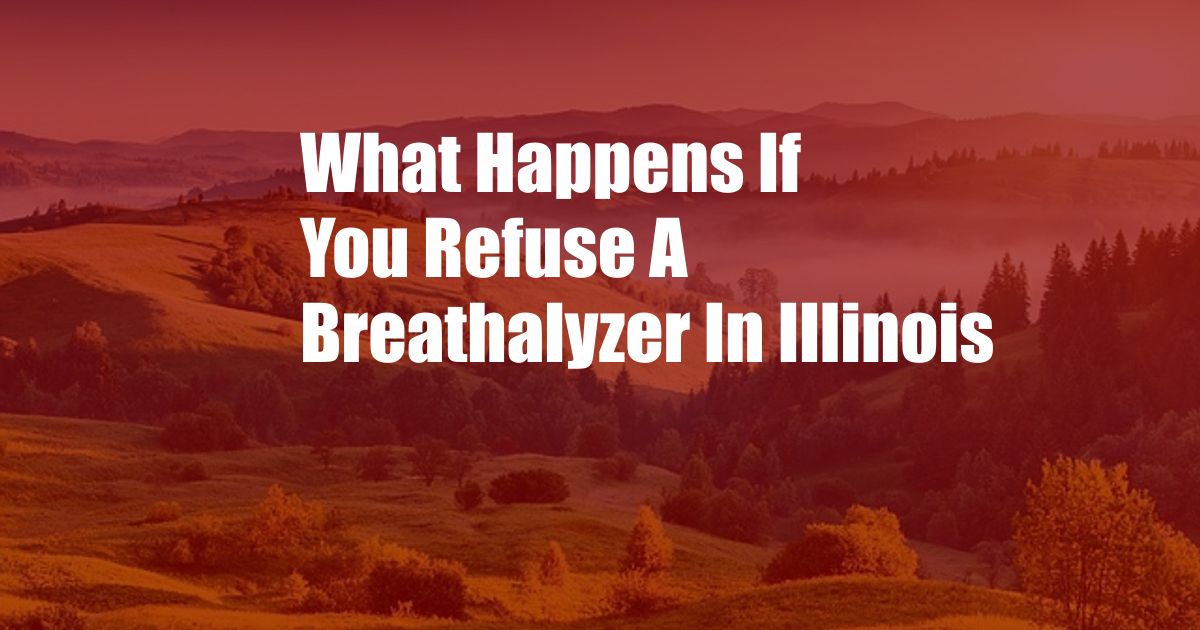
What Happens If You Refuse a Breathalyzer in Illinois?
Getting behind the wheel after consuming alcohol is a reckless decision that puts everyone on the road at risk. Law enforcement is dedicated to keeping impaired drivers off Illinois roads, and refusal to submit to a breathalyzer test can result in serious consequences.
Driving while intoxicated can have life-altering repercussions, and refusing a breathalyzer test can also have severe legal implications. Understanding the consequences of refusal will help you make the right choice when pulled over for DUI.
Illinois Implied Consent Law
Every driver in Illinois is deemed to have given consent to a breathalyzer test if arrested for DUI. This consent is implied, meaning you cannot legally refuse the test without facing penalties.
The implied consent law aims to protect public safety by ensuring law enforcement has the necessary evidence to convict impaired drivers. Breathalyzer tests provide objective, scientific proof of a driver’s blood alcohol concentration (BAC), a crucial piece of evidence for prosecutors.
Consequences of Refusing a Breathalyzer Test
Refusing to submit to a breathalyzer test in Illinois is a separate offense from DUI and carries its own set of significant penalties:
- Automatic License Suspension: Your license will be suspended for 12 months for a first refusal, 24 months for a second refusal, and 36 months for subsequent refusals.
- Enhanced DUI Penalties: Refusing a breathalyzer can result in increased fines, jail time, and a longer driver’s license suspension if you are convicted of DUI.
- Civil Penalties: In addition to criminal penalties, you may also face civil penalties, such as driver’s license reinstatement fees and SR-22 insurance requirements.
Tips and Expert Advice
If you are pulled over for DUI, it is strongly advised to cooperate with the officer and submit to a breathalyzer test. Refusing the test will only make matters worse and could have severe consequences.
Here are some additional tips to keep in mind:
- Understand Your Rights: You have the right to refuse a breathalyzer test, but be aware of the consequences. Discuss your options with an attorney before making a decision.
- Consequences Outweigh Risks: The penalties for refusing a breathalyzer are severe and often outweigh the potential risks of taking the test.
- Breathalyzer Evidence: A breathalyzer test can provide valuable evidence for both the prosecution and the defense. Refusing the test eliminates the possibility of using it in your favor.
Frequently Asked Questions
Q: Can I refuse a breathalyzer if I am not driving?
A: Yes, you can refuse a breathalyzer if you are a passenger in a vehicle that is pulled over. However, there may still be other penalties for being intoxicated in public.
Q: What happens if my BAC is below the legal limit?
A: If your BAC is below 0.08%, you will not be charged with DUI. However, refusing a breathalyzer can still result in a license suspension.
Conclusion
Refusing a breathalyzer in Illinois is a serious offense with significant consequences. Understanding the law and the potential penalties is crucial for making informed decisions when pulled over for DUI.
Always remember, driving under the influence is never worth the risk. If you choose to drink, make arrangements for a safe ride home to protect yourself and others on the road.
Are you interested in more information on DUI laws in Illinois? Visit our website or contact an experienced DUI attorney for guidance.